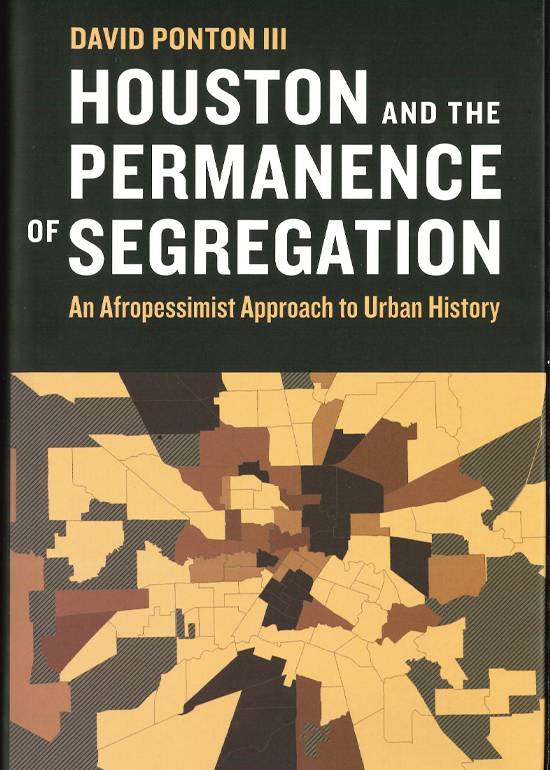
Houston and the Permanence of Segregation:
An Afropessimist Approach to Urban History
by David Ponton III.
Austin: University of Texas Press, 2024.
277 pp. $45.00 Hardcover.
Reviewed by
Eric Sarmiento
“To refer to the book’s contributions as ‘empirical’ would be an injustice, as Ponton’s Afropessimist account actively undermines the positivist ontologies upon which hegemonic notions of empiricism rest.”
To the limited degree that they have engaged with Houston, urbanists across the disciplines have tended to cast the city, with its endless sprawl, lack of formal zoning, and relentless cycles of what might be called creative self-destruction and reinvestment, as chaotic to the point of incoherence. In terms of planning for the common good or even functional efficiency, Greater Houston offers scant evidence for a counterargument. However, a spate of recent studies explores structuring forces at work in the city that, while not coherent per se, exhibit a relatively consistent and pervasive order rooted in the intersections of racialization, class struggle, gender, and other systematized axes of difference. David Ponton III’s historical monograph offers a brilliant, compelling, and deeply distressing but ultimately visionary addition to this growing body of scholarship.
One might frame the text as making invaluable empirical contributions to the lamentably meager existing scholarship on Houston. Ponton offers a powerful synthetic analysis of the long arc of segregation and the mechanisms by which racial capitalism has shaped Houston’s troubled geographies, structured around detailed accounts of several critical moments in the city’s fraught history vis-à-vis race, class, and gender: a violent altercation on a segregated city bus in 1951 and the subsequent criminal trial, the 1953 bombing of Dorothy and Jack Caesar’s home, a massive police raid on a men’s dorm at Texas Southern University in 1967, and others. Ponton’s treatment of these occurrences—all of which give the lie to Houston’s carefully cultivated self-image as an exceptional city when it comes to race relations—is an immense contribution to the historiography of the city and urbanization in the United States more broadly.
To refer to the book’s contributions as ‘empirical’ would be an injustice, as Ponton’s Afropessimist account actively undermines the positivist ontologies upon which hegemonic notions of empiricism rest. Houston’s racial capitalist development trajectory provides an avenue through which Ponton mounts a critique not only of history, his home discipline, but the entire project of liberal humanism at the heart of the contemporary world. Many readers will find the approach jarring. And that is the point. Notions of agency and contingency are central objects of critique: “there are no alternative pasts to comfort us,” Ponton writes, if we confront the notion that anti-blackness is not an aberration but rather constitutive of the modern world.
From this perspective, while Ponton is deeply sympathetic to and unfailingly honors the lives of his archival subjects, he is equally unflinching in his insistence that many Black Houstonians, including some of the city’s Civil Rights icons, are captives of not only racial capitalist legal systems, policing, housing policies, and labor markets, but also their belief in the American Dream and the promises of liberal humanist progress. A striking example: when Johnnie Lee Morris’s trial for responding violently to the brutality of Jim Crow ended in a life sentence rather than the death penalty, it was widely regarded as something of a victory for Black Houstonians. Ponton places this in context, noting:
Morris was relegated to a low-paying job as a longshoreman, was unable to legally remain married to his wife, was compelled to live in a small apartment in the economically declining Fourth Ward, was denigrated while trying to board a bus, was apprehended by the general public as a person without a right to self-defense against a white man, was unlawfully but apparently legally detained by violence workers without access to counsel, was placed on trial before an all-white jury with no legal recourse to challenge this blatant racial discrimination, and was sentenced to life in prison in a trial that signified for his supporters that fair justice had been accomplished.
This passage is emblematic of the way that Ponton rigorously builds his case throughout the book that the entire metropolitan area of Greater Houston replicates and extends the dehumanizing logics of the slave ship’s hold. In such a context, ‘progress’ appears as a cruel and disempowering illusion, a vector of capture and stasis rather an indicator of movement towards liberation and equality.
And yet Ponton highlights the ways in which Black Houstonians’ lives are, by violent and coercive necessity, characterized by motion. “[W]hat appears to be a dead end, or the abyss/nothing,” he writes, “can be a site of creativity – of thought in motion.” Thus the book’s experimental narrative approach to police violence at Texas Southern University in 1967 draws heavily on Black students’ archival testimonies to explore “the revolutionary epistemes that ordinary black people developed with each other in response to the coercions of anti-blackness.” In this trajectory of thought, the book’s embrace of pessimism is ultimately what makes its argument profoundly hopeful. Where redemptive faith in this world is central to the continued power of racial capitalist modernity, Ponton asserts, the book’s unveiling of the utopian fantasies of liberal humanism allows us to dream ‘impossible dreams’: “Reimagining the very foundations upon which worlds are made is not a call to invert existing relations where the oppressed become superior members on the same hierarchical structure, but rather it is an opportunity to invent or inaugurate new ways of relation – to each other, to property (or better yet, to the idea of property), to environment, to space, and to power.” This book makes a compelling case that Houston is one important site among many for such ongoing experiments in world-building.
Eric Sarmiento is a critical human geographer with expertise in urban geography, cultural geography, and political ecology. He is an associate professor of geography at Texas State University.
